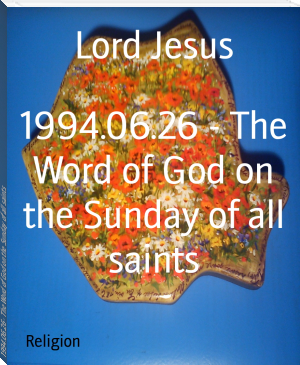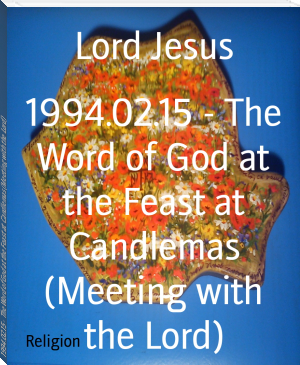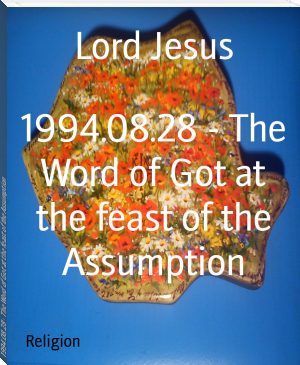Orthodoxy - G. K. Chesterton (books to read to get smarter .TXT) 📗

- Author: G. K. Chesterton
- Performer: -
Book online «Orthodoxy - G. K. Chesterton (books to read to get smarter .TXT) 📗». Author G. K. Chesterton
The whole point indeed is perfectly expressed in the very word which we use for a man in hospital; “patient” is in the passive mood; “sinner” is in the active. If a man is to be saved from influenza, he may be a patient. But if he is to be saved from forging, he must be not a patient but an IMPATIENT. He must be personally impatient with forgery. All moral reform must start in the active not the passive will.
Here again we reach the same substantial conclusion. In so far as we desire the definite reconstructions and the dangerous revolutions which have distinguished European civilization, we shall not discourage the thought of possible ruin; we shall rather encourage it.
If we want, like the Eastern saints, merely to contemplate how right things are, of course we shall only say that they must go right.
But if we particularly want to MAKE them go right, we must insist that they may go wrong.
Lastly, this truth is yet again true in the case of the common modern attempts to diminish or to explain away the divinity of Christ.
The thing may be true or not; that I shall deal with before I end.
But if the divinity is true it is certainly terribly revolutionary.
That a good man may have his back to the wall is no more than we knew already; but that God could have his back to the wall is a boast for all insurgents for ever. Christianity is the only religion on earth that has felt that omnipotence made God incomplete.
Christianity alone has felt that God, to be wholly God, must have been a rebel as well as a king. Alone of all creeds, Christianity has added courage to the virtues of the Creator.
For the only courage worth calling courage must necessarily mean that the soul passes a breaking point—and does not break.
In this indeed I approach a matter more dark and awful than it is easy to discuss; and I apologise in advance if any of my phrases fall wrong or seem irreverent touching a matter which the greatest saints and thinkers have justly feared to approach.
But in that terrific tale of the Passion there is a distinct emotional suggestion that the author of all things (in some unthinkable way) went not only through agony, but through doubt. It is written, “Thou shalt not tempt the Lord thy God.” No; but the Lord thy God may tempt Himself; and it seems as if this was what happened in Gethsemane.
In a garden Satan tempted man: and in a garden God tempted God.
He passed in some superhuman manner through our human horror of pessimism. When the world shook and the sun was wiped out of heaven, it was not at the crucifixion, but at the cry from the cross: the cry which confessed that God was forsaken of God. And now let the revolutionists choose a creed from all the creeds and a god from all the gods of the world, carefully weighing all the gods of inevitable recurrence and of unalterable power. They will not find another god who has himself been in revolt. Nay, (the matter grows too difficult for human speech,) but let the atheists themselves choose a god.
They will find only one divinity who ever uttered their isolation; only one religion in which God seemed for an instant to be an atheist.
These can be called the essentials of the old orthodoxy, of which the chief merit is that it is the natural fountain of revolution and reform; and of which the chief defect is that it is obviously only an abstract assertion. Its main advantage is that it is the most adventurous and manly of all theologies.
Its chief disadvantage is simply that it is a theology. It can always be urged against it that it is in its nature arbitrary and in the air.
But it is not so high in the air but that great archers spend their whole lives in shooting arrows at it—yes, and their last arrows; there are men who will ruin themselves and ruin their civilization if they may ruin also this old fantastic tale. This is the last and most astounding fact about this faith; that its enemies will use any weapon against it, the swords that cut their own fingers, and the firebrands that burn their own homes. Men who begin to fight the Church for the sake of freedom and humanity end by flinging away freedom and humanity if only they may fight the Church.
This is no exaggeration; I could fill a book with the instances of it.
Mr. Blatchford set out, as an ordinary Bible-smasher, to prove that Adam was guiltless of sin against God; in manoeuvring so as to maintain this he admitted, as a mere side issue, that all the tyrants, from Nero to King Leopold, were guiltless of any sin against humanity.
I know a man who has such a passion for proving that he will have no personal existence after death that he falls back on the position that he has no personal existence now. He invokes Buddhism and says that all souls fade into each other; in order to prove that he cannot go to heaven he proves that he cannot go to Hartlepool.
I have known people who protested against religious education with arguments against any education, saying that the child’s mind must grow freely or that the old must not teach the young. I have known people who showed that there could be no divine judgment by showing that there can be no human judgment, even for practical purposes.
They burned their own corn to set fire to the church; they smashed their own tools to smash it; any stick was good enough to beat it with, though it were the last stick of their own dismembered furniture.
We do not admire, we hardly excuse, the fanatic who wrecks this world for love of the other. But what are we to say of the fanatic who wrecks this world out of hatred of the other? He sacrifices the very existence of humanity to the non-existence of God.
He offers his victims not to the altar, but merely to assert the idleness of the altar and the emptiness of the throne.
He is ready to ruin even that primary ethic by which all things live, for his strange and eternal vengeance upon some one who never lived at all.
And yet the thing hangs in the heavens unhurt. Its opponents only succeed in destroying all that they themselves justly hold dear.
They do not destroy orthodoxy; they only destroy political and common courage sense. They do not prove that Adam was not responsible to God; how could they prove it? They only prove (from their premises) that the Czar is not responsible to Russia.
They do not prove that Adam should not have been punished by God; they only prove that the nearest sweater should not be punished by men.
With their oriental doubts about personality they do not make certain that we shall have no personal life hereafter; they only make certain that we shall not have a very jolly or complete one here.
With their paralysing hints of all conclusions coming out wrong they do not tear the book of the Recording Angel; they only make it a little harder to keep the books of Marshall & Snelgrove.
Not only is the faith the mother of all worldly energies, but its foes are the fathers of all worldly confusion. The secularists have not wrecked divine things; but the secularists have wrecked secular things, if that is any comfort to them. The Titans did not scale heaven; but they laid waste the world.
IX AUTHORITY AND THE ADVENTURERThe last chapter has been concerned with the contention that orthodoxy is not only (as is often urged) the only safe guardian of morality or order, but is also the only logical guardian of liberty, innovation and advance. If we wish to pull down the prosperous oppressor we cannot do it with the new doctrine of human perfectibility; we can do it with the old doctrine of Original Sin. If we want to uproot inherent cruelties or lift up lost populations we cannot do it with the scientific theory that matter precedes mind; we can do it with the supernatural theory that mind precedes matter.
If we wish specially to awaken people to social vigilance and tireless pursuit of practise, we cannot help it much by insisting on the Immanent God and the Inner Light: for these are at best reasons for contentment; we can help it much by insisting on the transcendent God and the flying and escaping gleam; for that means divine discontent. If we wish particularly to assert the idea of a generous balance against that of a dreadful autocracy we shall instinctively be Trinitarian rather than Unitarian. If we desire European civilization to be a raid and a rescue, we shall insist rather that souls are in real peril than that their peril is ultimately unreal. And if we wish to exalt the outcast and the crucified, we shall rather wish to think that a veritable God was crucified, rather than a mere sage or hero. Above all, if we wish to protect the poor we shall be in favour of fixed rules and clear dogmas.
The RULES of a club are occasionally in favour of the poor member.
The drift of a club is always in favour of the rich one.
And now we come to the crucial question which truly concludes the whole matter. A reasonable agnostic, if he has happened to agree with me so far, may justly turn round and say, “You have found a practical philosophy in the doctrine of the Fall; very well.
You have found a side of democracy now dangerously neglected wisely asserted in Original Sin; all right. You have found a truth in the doctrine of hell; I congratulate you. You are convinced that worshippers of a personal God look outwards and are progressive; I congratulate them. But even supposing that those doctrines do include those truths, why cannot you take the truths and leave the doctrines? Granted that all modern society is trusting the rich too much because it does not allow for human weakness; granted that orthodox ages have had a great advantage because (believing in the Fall) they did allow for human weakness, why cannot you simply allow for human weakness without believing in the Fall?
If you have discovered that the idea of damnation represents a healthy idea of danger, why can you not simply take the idea of danger and leave the idea of damnation? If you see clearly the kernel of common-sense in the nut of Christian orthodoxy, why cannot you simply take the kernel and leave the nut?
Why cannot you (to use that cant phrase of the newspapers which I, as a highly scholarly agnostic, am a little ashamed of using) why cannot you simply take what is good in Christianity, what you can define as valuable, what you can comprehend, and leave all the rest, all the absolute dogmas that are in their nature incomprehensible?”
This is the real question; this is the last question; and it is a pleasure to try to answer it.
The first answer is simply to say that I am a rationalist.
I like to have some intellectual justification for my intuitions.
If I am treating man as a fallen being it is an intellectual convenience to me to believe that he fell; and I find, for some odd psychological reason, that I can deal better with a man’s exercise of freewill if I believe that he has got it. But





Comments (0)